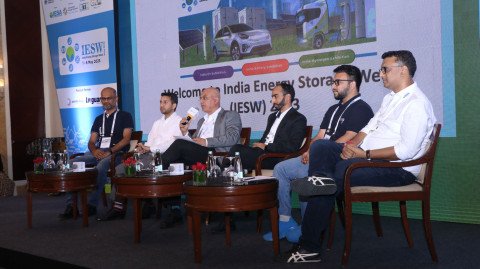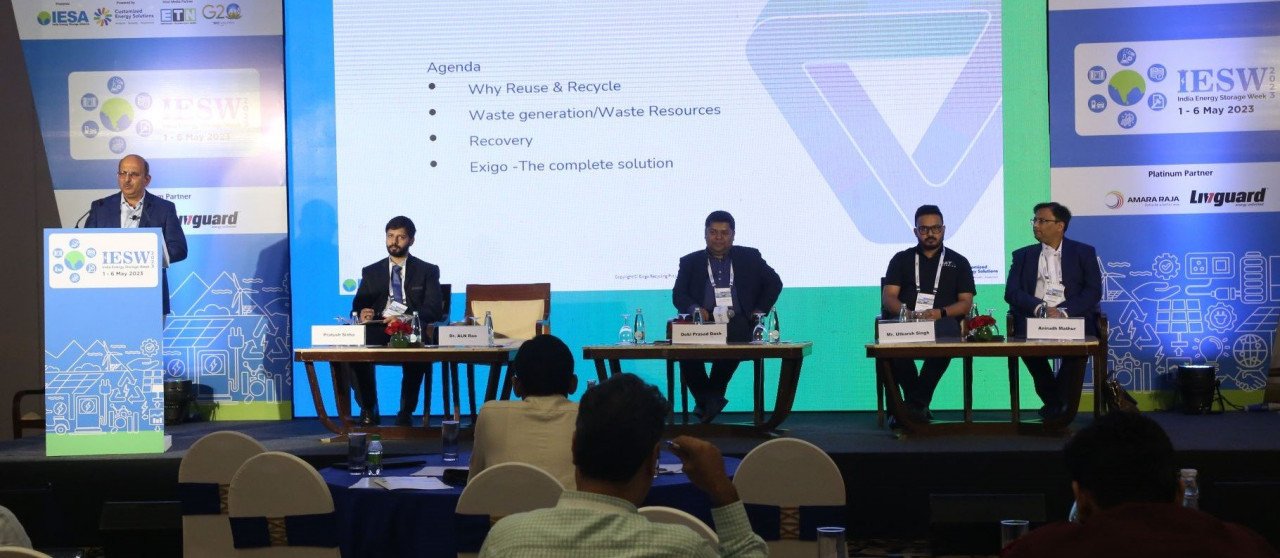With the rapid emergence of li-ion battery use in EVs and other applications in recent times, there is a strong demand for battery reuse and recycling in India. However, safe, efficient, and sustainable repurpose or recycling of used batteries is muddled with viability and regulatory challenges, opined the speakers at the recently-held IESW 2023 technical forum on battery recycling and circular economy.
The EV and battery industry is faced with a quintessential dilemma of what to do with used lithium-ion batteries that have either reached a minimum threshold of SOH (state of health) level – thereby making them inefficient and unfit for the required application - or already attained their end-of-life with signs of poor energy retention and increased safety risks.
Reuse and recycling may sound like a comprehensive solution this dilemma, but mass repurposing or extraction of materials from used batteries is not that easy, thanks to plethora of supply chain, regulatory, technological, and viability constraints faced by recyclers.
Speaking at the 9th edition of India Energy Storage Week (IESW) at New Delhi, Dr ALN Rao, Chief Executive Officer, Exigo Recycling, addressed on the critical aspects of responsibility and ownership of sourcing used batteries for recycling, mass-scaling, and different technologies available for recycling.
"Is reuse and recycling the last-stage of the battery chain or the starting point of a new value chain? It is a mass-production process or a customization job? Whose responsibility is it to own the battery reuse, and what chemistries are conducive for reusing? These are the questions before us, and finding innovative and effective solutions are the pressing need for recyclers", he said.
Some of his key observations on reusing and recycling include:
- Reuse options include reconditioning, refurbishing, and repurposing the batteries for different applications.
- While EVs require a minimum of 80 percent SOH for operational efficiency, the grid energy storage applications require 60 percent SOH.
- Hydrometallurgy remains to be the most preferred recycling technology globally and in India as well.
- Copper, Aluminium, and Graphite are common all battery chemistries, representing more than 65 percent of recovered materials.
- India is predicted to stand at a 75 GWh cumulative demand for recycling by 2030.
"For successful electrification of automobiles, we need to have an efficient and viable recycling solution. India is building cells now, but is not developing capabilities in mining, refining, and battery materials. But the rest of the world is focusing from mining to cell making", commented Pratyush Sinha, VP of Special Projects, Lohum Cleantech. He disagreed with Dr ALN Rao on the size of the recycling market in India, by arguing that it will be relative smaller than other leading EV markets.
Utkarsh Singh, Chief Executive Officer, BatX Energies said that India has one of the highest cost of li-ion battery scrap of up to $ 3.5 per kg, which should be a strong motivation for recyclers to develop new solutions. He noted that a new lithium-ion cell can be made only using recycled battery materials, although repurposing batteries for second-life is going to be a bigger market than recycling.
In terms of challenges associated with the recycling in India, Dr ALN Rao pointed out the following factors:
- Constant technological changes in battery design and chemistry demands greater customizations for recycling.
- Absence of traceability mechanism for batteries in the Indian market
- Inadequate governance mechanism to enforce EPR targets, implementation of recycling and waste management rules, and validation of processes.
- Dominance of unorganized players in recycling, which raises costs of organized sector recyclers.
Further, Lohum Cleantech's Pratyush Sinha highlighted the lack of access to feedstock in the Indian market and absence of direct local customers for battery recyclers, as the country does not have any large cathode manufacturing capacity as of now.
Anirudh Mathur, Chief of Staff, Ace Green Recycling, highlighted certain positive trends in the recycling scenario at present globally, with many countries including battery material supply chain in their national security ambit and policy standards.
The speakers opined that the cost structures and capabilities of the local chemical industry can work in favour of India in battery recycling. They called for US's IRA-like incentive scheme in the country, with focus on the entire value chain, and local integration and international collaboration to make India a recycling hub.
Stay tuned to ETN's IESW 2023 Show Daily and our LinkedIn page for daily updates on the entire week of dialogue and exhibition of clean energy technologies and solutions. To learn more about the event, visit IESW 2023.
(With inputs from Dr. Ajinkya Shrish Kamat and Bhupesh Verma)

IESW 2023: Taking a grip of emerging Technological megatrends
Read More

